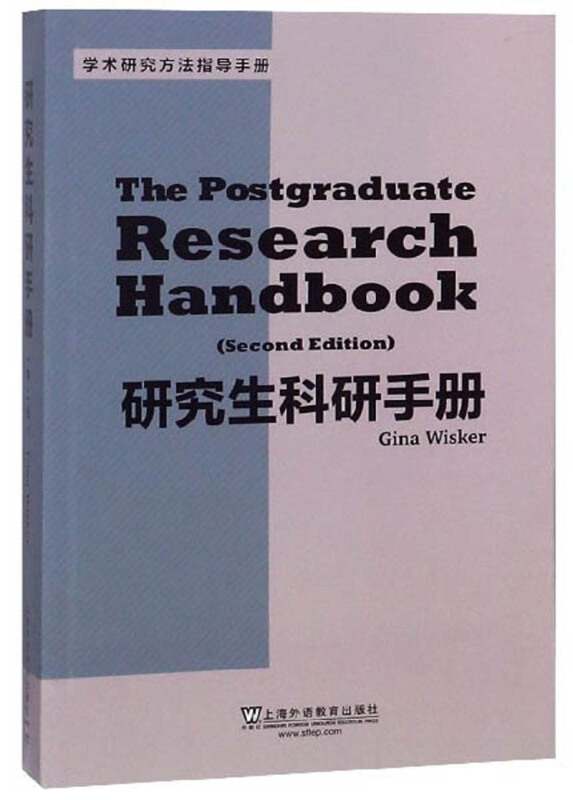- ISBN:9787544655194
- 装帧:一般胶版纸
- 册数:暂无
- 重量:暂无
- 开本:21cm
- 页数:428页
- 出版时间:2018-11-01
- 条形码:9787544655194 ; 978-7-5446-5519-4
本书特色
【出版说明】 外教社秉承致力学术创新、促进学术繁荣的宗旨,以服务教学科研、人才培养、文化传承与传播为己任,以高品质的学术出版来引领外语学科建设与发展,为我国外语教学和科研提供了丰富的学术资源。 在外语科研方面,外教社曾先后推出《教育与社科研究入门指南》《小型社科项目研究方法指南》等参考用书,其中《MLA格式指南及学术出版准则》(第二版)(第三版)和《MLA科研论文写作规范》(第五版)(第七版)备受广大读者欢迎,成为外语界论文作者的**工具书。 为进一步解决国内硕士、博士研究生在撰写科研论文和掌握科研方法方面所面临的各种问题和困惑,外教社推出“学术研究方法指导手册”。本套手册融理论和实践为一体,阐释系统、深入,既囊括了对于论文撰写结构与步骤上所有要素的介绍和分析,又涉及有关项目调研、选题论证、时间管理、成果出版、自我评价等方法上的科学指导,为论文撰写规范化提供指南,并对培养研究能力、开辟研究领域和拓展研究思路给予启示。 本套手册对于广大硕士、博士研究生的论文撰写有很好的指导作用,尤其是对人文学科和社会科学领域的硕士、博士研究生的科研工作有非常强的针对性和实用性,对于硕士、博士研究生的学科导师也具有较强的借鉴意义和参考价值。
内容简介
This Lively, rigorous and research-informed book is essential reading on any postgraduatecourse. Providing you with invaluable guidance on how to plan and conduct your research,it helps keep your momentum going, shows how you can enjoy the research process itselfand ultimately ensures you are able to produce a high quality dissertation or thesis.Revised and updated throughout, the second edition includes additional material onmethodology and theorising, as well as content on the skills needed to succeed after yourstudy is completed.
目录
-

我有所念人,隔在远远乡
¥17.9¥49.8 -

了不起的盖茨比(纯英文)/床头灯英语.3000词读物
¥5.5¥12.8 -

茶花女
¥4.8¥12.0 -

小妇人(纯英文)/床头灯英语.3000词读物
¥6.4¥15.8 -

地心游记(纯英文)/床头灯英语.3000词读物
¥6.2¥15.8 -

巴黎圣母院
¥5.6¥15.5 -

视听说教程2学生用书
¥17.6¥45.0 -

命案目睹记
¥13.2¥33.8 -

THE GREAT GATSBY-了不起的盖茨比
¥6.0¥16.8 -

考研英语背单词20个词根词缀
¥2.2¥3.2 -

汤姆叔叔的小屋
¥13.7¥35.0 -

了不起的盖茨比:经典全译本
¥10.5¥25.0 -

英语学习-大家小书
¥14.7¥36.0 -

英汉典藏-沙与沫
¥10.0¥21.8 -

浮生六记(汉英对照)
¥18.9¥65.0 -

蝇王
¥17.8¥21.0 -

ANIMAL FARM-动物庄园-英文版
¥16.1¥32.8 -

好快!10天背完3000英语单词
¥15.8¥29.8 -

哈克贝里.芬历险记-(英语原著版.第六辑)
¥9.0¥18.0 -

圣经的故事:汉英对照
¥13.9¥36.8













